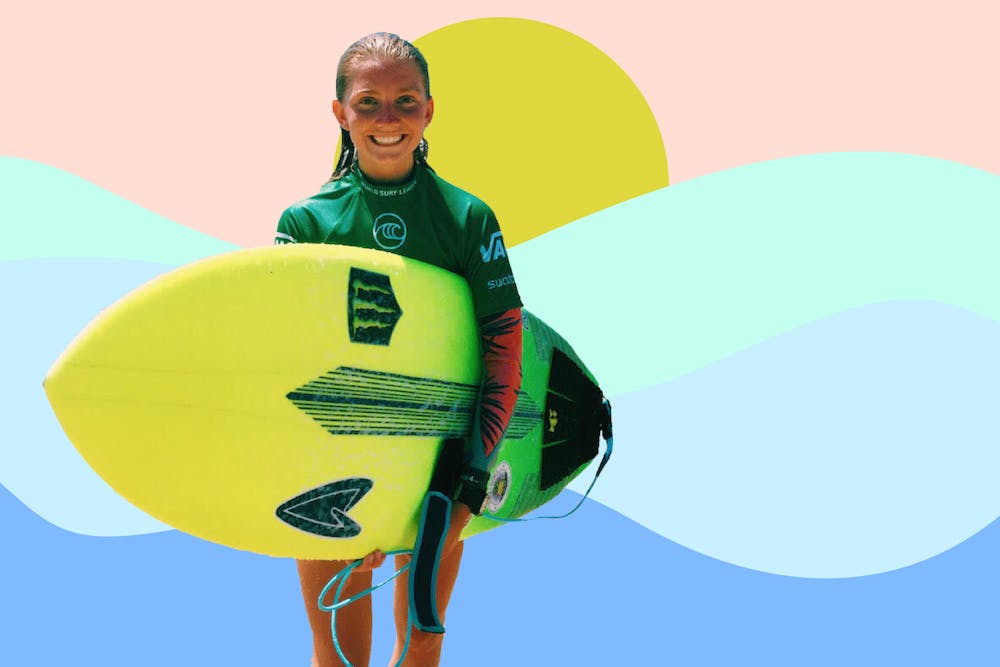The cozy, cosmopolitan atmosphere of her apartment in Philadelphia is a far cry from the wave-soaked sand of the Jersey Shore, but that hasn’t stopped Emily Grossarth (C/W ’24) from pursuing her passion for surfing at Penn.
Emily founded the Penn Surf Club in an attempt to create a close–knit community for surfers at Penn, both on and off the shore. Starting this November, the club plans to host watch parties with commentary of the World Surf League—which she describes as “the NFL of surfing.” Eventually, she hopes for the club to become a forum for collegiate surfers to share surfing recommendations and plan meet–ups.
Laughing, the club founder remarks that she especially looks forward to forming a close–knit surf community where members can share their surf experiences "because everyone has a terrible wipe–out story.”
Hers happened when she was six: “I was surfing down the wave, and this kayaker comes behind me, and looks like he’s about to run into me,” she describes. “He actually hit my legs and I fell into his lap and rode the wave sitting in this random kayaker’s lap. My dad was freaking out because he thought I’d never want to surf again—he’s like, ‘Oh my god, she’s going to be traumatized’—but apparently I had a really fun time doing it, so catastrophe avoided.”
Clearly, one surprise run–in with a kayaker was not enough to wipe out Emily’s love for surfing. In fact, this isn’t the first year's first time founding a club for surfers. She also led the creation of her high school’s surf team, which she reflects helped her escape the stress of school with its daily practices throughout the year. She found her focus balancing atop the playful cerulean waves of the Atlantic Ocean: “Surfing is one of the few moments where you have absolutely no urge to check your phone or talk to other people, and it’s pretty easy to be present in yourself.”
The 2018 East Coast All Star Surfer began surfing at age four. She started surfing competitively at age fifteen, earning a spot competing in the US Open of Surfing in 2019. “It’s a huge adrenaline rush regardless of the contest,” she reminisces about the thrill of competing, which she’s missed dearly in the wake of the pandemic.
“It had that duality in that—yes—it made me nervous and stressed when I was competing, but also was really, really good at calming me down.”
The ability to stay calm in the face of turbulence is not the only skill that the New Jersey native has gained from surfing. Competitive surfers need to be resilient and patient, able to adapt to ever–changing weather conditions and wave patterns, and adept at identifying the best waves to catch.
For six hours a day, seven days a week, this self–proclaimed “beach girl” has spent her past two summers teaching kids how to navigate Atlantic waves. She reflects that the 'mental element' of surfing has been the hardest to teach: “[The students] want to catch all the waves and you have to remind them that not all of [the waves] are good. It’s really about being patient with them and allowing them to grow. ”
Her students are mostly young girls, which Emily notes is intentional. Historically, the sport has had a great deal of gender inequality and been fairly resistant to change. For instance, her high school varsity surf team had a mandated number of six boys to two girls, where the girls were not permitted to compete on behalf of the boys. However, Emily remains optimistic and ever–dedicated to changing the culture. She points out that surfing is one of the first sports to institute equal pay at the professional level. Emily looks up to the work of big wave surfer Laura Enever who “paddles out when it’s fifty, sixty feet with all the men and just completely shows them up.” The surf instructor hopes to empower her female students to a similar degree: “I wanted to give them the confidence they needed to go out and surf and show up all the boys.”
Penn Surf Club is another place where the Huntsman first year wants to emphasize diversity and inclusivity. All surf enthusiasts are welcome to join: “Even though we can’t surf all the time, we can still bring together a community of like–minded people who love to surf.”







